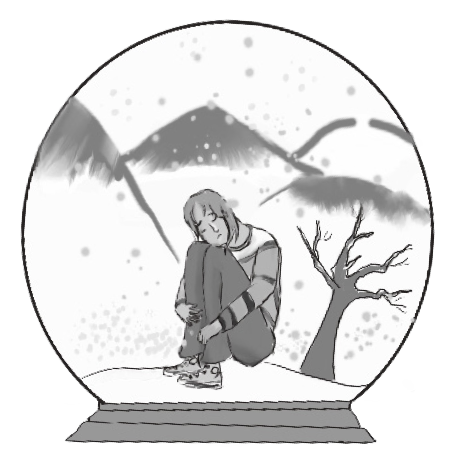Breaking the winter blues: how PHS can help students tackle seasonal depression
February, 2023
Let’s start with a quick question — what even is seasonal depression? Seasonal depression, also known as seasonal affective disorder (SAD), is a type of depression associated with the changing of seasons. It usually manifests during the winter months but can also occur during other times of the year.
The reduced level of sunlight in fall and winter may cause winter-onset seasonal depression. This decreased level of sunlight can disrupt your body’s internal clock and lead to feelings of melancholy. Because of the shorter days and longer hours of darkness in fall and winter, higher levels of melatonin and lower levels of serotonin are produced. Higher melatonin levels cause a person to feel sleepy and less energetic, while lower serotonin levels limit feelings of happiness. Some symptoms that commonly manifest in students include feelings of hopelessness, irregular eating and sleeping patterns, difficulties with concentration and memory, fatigue, and social withdrawal.
Since seasonal depression especially affects teenagers, PHS needs to be especially attentive to its effects. Schools play a crucial role in supporting students during this time, as we spend the majority of the day in a school environment. When students are already dealing with cold and dark weather as well as decreased daylight hours, what can our school do to better support students with seasonal depression?
First off, PHS should start encouraging more students to take advantage of the mental health support services available at PHS, such as speaking to the school counselors, visiting the school psychologist, or going to the Wellness Center by the guidance office to get snacks and relax. These services can be really helpful for students who need time to talk about feeling overwhelmed, or stressed about school or life in general.
These solutions are not perfect, though, as students have to go through a procedure of scheduling time slots and missing class in order to meet with counselors or visit the school psychologist. Missing class can cause students to fall behind on classwork, making it even harder for them to cope with the growing workload they receive from school everyday.
To make mental health services more accessible to students, PHS should also offer other activities to help students cope with mental health issues. For example, PHS could plan outdoor activities for students to participate in and extend breaks to let students spend more time outside. If the weather is particularly good, PHS should encourage teachers to teach their classes outside, if possible. Exposure to sunlight has been shown to have a positive impact on seasonal depression.
The National Library of Medicine found that diets can also provide benefits for people coping with seasonal depression. With this knowledge, PHS could alter cafeteria menus to have more foods higher in B12 and omega-3 fatty acids, such as spinach, dairy, and fish. These chemicals play vital roles in synthesizing serotonin, boosting energy as a result.
Furthermore, teachers should be trained to recognize the signs of seasonal depression and offer appropriate support to students who may be struggling. This would allow teachers to understand the student’s point of view and help them accordingly, or recommend activities and support services that the student could use to their benefit.
Seasonal depression is not just an issue in the winter, as it is also present at a smaller scale during the summer. Going forward, PHS can help students prepare for the summer months by providing resources such as summer programs or activities that promote socialization, as well as by providing mental health support services throughout the summer months.
By raising awareness and teaching students about seasonal depression, PHS can work harder to break down the stigma surrounding mental health issues. PHS should be a space where seasonal depression can be talked about in a way that helps students find solutions to this issue, and promotes taking a step towards improving their own mental health during these harsh months.